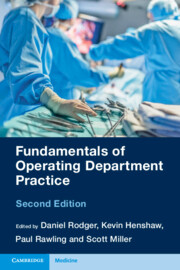Book contents
- Fundamentals of Operating Department Practice
- Fundamentals of Operating Department Practice
- Copyright page
- Contents
- Contributors
- Foreword
- Chapter 1 The Caring Perioperative Practitioner
- Chapter 2 Evidence-Based Operating Department Practice
- Chapter 3 Healthcare Ethics and Professional Regulation in Operating Department Practice
- Chapter 4 Operating Department Practice and the Law
- Chapter 5 Health and Safety in the Perioperative Environment
- Chapter 6 Fundamentals of Operating Department Design
- Chapter 7 Fundamentals of Infection Prevention and Control in the Operating Department
- Chapter 8 Fundamentals of Cardiovascular Physiology
- Chapter 9 Recognition and Interpretation of the Electrocardiogram
- Chapter 10 Fundamentals of Respiratory Physiology
- Chapter 11 Introduction to General Anaesthesia
- Chapter 12 Fundamentals of Airway Management
- Chapter 13 Artificial Ventilation
- Chapter 14 Management of Perioperative Medical Emergencies
- Chapter 15 Total Intravenous Anaesthesia
- Chapter 16 Fundamentals of Basic Patient Monitoring
- Chapter 17 Haemodynamic Monitoring
- Chapter 18 Fundamentals of Regional Anaesthesia
- Chapter 19 Fundamentals of the Anaesthetic Machine
- Chapter 20 Anaesthetic Breathing Systems
- Chapter 21 Pharmacological Agents in Anaesthetic Practice
- Chapter 22 Fundamentals of Emergency Obstetric Care
- Chapter 23 Care of the Bariatric Patient
- Chapter 24 Fundamentals of Decontamination and Sterilisation
- Chapter 25 Management and Use of Medical Equipment
- Chapter 26 Fundamentals of the Surgical Scrub Role
- Chapter 27 Fundamentals of Patient Positioning for Surgery
- Chapter 28 Fundamentals of Perioperative Thermoregulation
- Chapter 29 Fundamentals of Fluid and Electrolyte Balance during Surgery
- Chapter 30 The Physiology of Blood and Its Administration
- Chapter 31 Fundamentals of Wound Healing, Dressings, and Drains
- Chapter 32 Understanding Sutures and Skin Closure
- Chapter 33 Perioperative Care of the Paediatric Patient
- Chapter 34 Perioperative Pain Management
- Chapter 35 Recovery of Patients from Anaesthesia and Surgery
- Chapter 36 The Fundamentals of Emergency Resuscitation
- Chapter 37 Human Factors, Ergonomics, and Non-technical Skills
- Chapter 38 Understanding Intraoperative Death
- Chapter 39 Extended and Advanced Roles in Perioperative Practice
- Index
- References
Chapter 1 - The Caring Perioperative Practitioner
Published online by Cambridge University Press: 18 August 2022
- Fundamentals of Operating Department Practice
- Fundamentals of Operating Department Practice
- Copyright page
- Contents
- Contributors
- Foreword
- Chapter 1 The Caring Perioperative Practitioner
- Chapter 2 Evidence-Based Operating Department Practice
- Chapter 3 Healthcare Ethics and Professional Regulation in Operating Department Practice
- Chapter 4 Operating Department Practice and the Law
- Chapter 5 Health and Safety in the Perioperative Environment
- Chapter 6 Fundamentals of Operating Department Design
- Chapter 7 Fundamentals of Infection Prevention and Control in the Operating Department
- Chapter 8 Fundamentals of Cardiovascular Physiology
- Chapter 9 Recognition and Interpretation of the Electrocardiogram
- Chapter 10 Fundamentals of Respiratory Physiology
- Chapter 11 Introduction to General Anaesthesia
- Chapter 12 Fundamentals of Airway Management
- Chapter 13 Artificial Ventilation
- Chapter 14 Management of Perioperative Medical Emergencies
- Chapter 15 Total Intravenous Anaesthesia
- Chapter 16 Fundamentals of Basic Patient Monitoring
- Chapter 17 Haemodynamic Monitoring
- Chapter 18 Fundamentals of Regional Anaesthesia
- Chapter 19 Fundamentals of the Anaesthetic Machine
- Chapter 20 Anaesthetic Breathing Systems
- Chapter 21 Pharmacological Agents in Anaesthetic Practice
- Chapter 22 Fundamentals of Emergency Obstetric Care
- Chapter 23 Care of the Bariatric Patient
- Chapter 24 Fundamentals of Decontamination and Sterilisation
- Chapter 25 Management and Use of Medical Equipment
- Chapter 26 Fundamentals of the Surgical Scrub Role
- Chapter 27 Fundamentals of Patient Positioning for Surgery
- Chapter 28 Fundamentals of Perioperative Thermoregulation
- Chapter 29 Fundamentals of Fluid and Electrolyte Balance during Surgery
- Chapter 30 The Physiology of Blood and Its Administration
- Chapter 31 Fundamentals of Wound Healing, Dressings, and Drains
- Chapter 32 Understanding Sutures and Skin Closure
- Chapter 33 Perioperative Care of the Paediatric Patient
- Chapter 34 Perioperative Pain Management
- Chapter 35 Recovery of Patients from Anaesthesia and Surgery
- Chapter 36 The Fundamentals of Emergency Resuscitation
- Chapter 37 Human Factors, Ergonomics, and Non-technical Skills
- Chapter 38 Understanding Intraoperative Death
- Chapter 39 Extended and Advanced Roles in Perioperative Practice
- Index
- References
Summary
Care is a fundamental principle that is at the centre of operating department practice. It involves consideration of the patients‘ physical, psychological, and emotional needs whilst respecting their social and cultural beliefs. Perioperative care is not a single event but rather a process that starts with the assessment of patient needs and identification of risks, which are then planned for, implemented, and evaluated as the patient moves through each stage of their journey. The whole process is documented using the framework of a nursing model and perioperative practitioners become experienced in prompt care planning to ensure that the care delivered is safe, effective, and responsive. All perioperative practitioners are responsible for the care they deliver through a duty of care to their employer and the patient. Registered practitioners are also accountable to their regulatory body who set the standards for education and practice. Reflection, as part of continuing professional development, allows practitioners to gain a deeper understanding of the care they provide.
- Type
- Chapter
- Information
- Fundamentals of Operating Department Practice , pp. 1 - 8Publisher: Cambridge University PressPrint publication year: 2022



